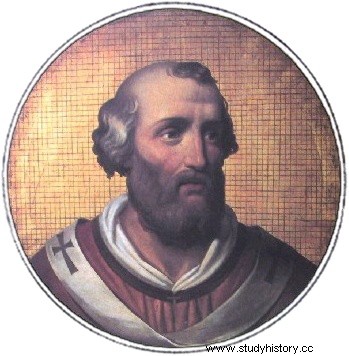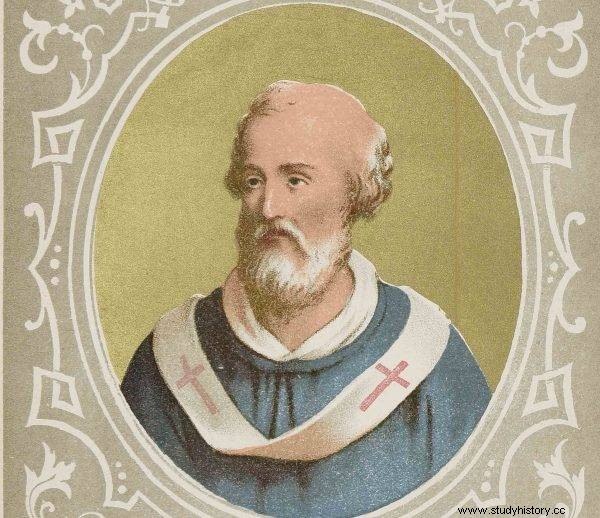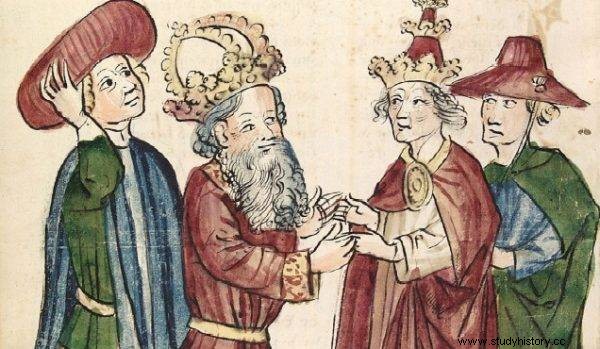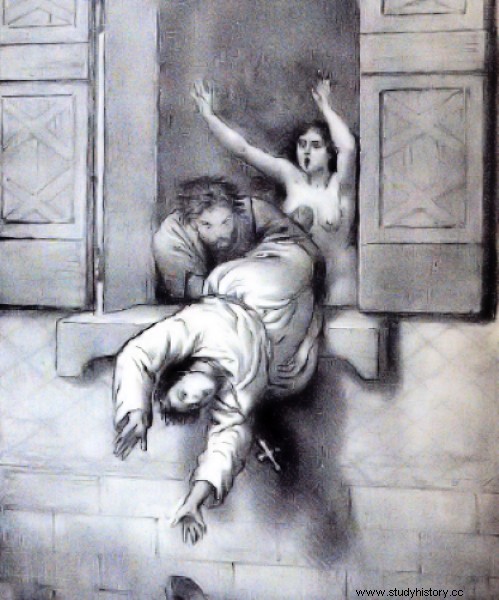The pages of history are full of descriptions of the popes' lush erotic life, nepotism and pride. They all pale in comparison to what John XII did.
“Then the Cardinal Priest stood up and testified that he had seen John XII celebrate Mass without taking communion. Both John, Bishop of Narni, and John, Cardinal Deacon, confessed that they had seen the ordination of deacons in the stable with their own eyes, but were unsure of the date, ”Liutprand, Bishop of Cremona reported indignantly. And were not the only, nor the gravest of the charges brought in 963 at the Roman synod against ... the pope.
The pontificates of many popes were far from elations of prayer, concern for the good of others and the Church. On the other hand, the pages of history are full of descriptions of the lush erotic life of the successors of St. Peter, examples of pride, nepotism, and trafficking with the sacraments and church positions. And the thirst for wealth and the struggle for power seemed to be the true nature of the governors of Christ . Before the godless reign of Renaissance Alexander VI - that is, Rodrigo Borgia - came, his medieval predecessors were little different from him.
Ancient patterns?
The future bishop of Rome, John XII, was born probably in 937 AD. The parents were the self-proclaimed prince of Rome, Alberyk II, and his half-sister Alda. And as the incestuous relationship alluded to ancient patterns, the name Octavian, given to the baby, only confirmed the prince's source of inspiration . Even earlier, when in 932, Alberyk called himself the ruler of Rome, he adopted a title of equally ancient roots - Princeps atque Senator omnium Romanorum . And like the Roman emperor for over 20 years he reigned supreme in the Eternal City by designating as many as four popes to the throne of Peter.

John XII was the last pope of the pornographic period
In 954, however, Alberyk fell to a mysterious disease. Sensing that the end was approaching, he forced the lay and church dignitaries gathered at his deathbed, with the incumbent Pope Agapitus II at the helm, a promise to elect Octavian as the next pope. This was a clear violation of Pope Symmachus' decree of Consilium dilectionis vestrae from AD 499. This document prohibited the conclusion of contracts for the election of a successor before the death of the incumbent pope and nominated only clergymen as electors and ordered election by acclamation or by majority. In Rome, however, no one felt embarrassed by this provision.
The prince died shortly after, and Octavian succeeded him. A year later, when Pope Agapitus II also left the earthly vale, the "people" of Rome kept their promise, and only an 18-year-old young man, the youngest pope in history, took the throne of Christ's governor on earth. If only the noble nobiles knew what they agreed to ...
Young Pope
Being the second pope in history to take the new name, the young prince called himself John XII . This seemed to confirm the dual role that the successor of Albery and Agapite intended to play in Rome - as Octavian to exercise princely authority and as John to direct the affairs of the Church.

Being the second pope in history to take the new name, the young prince named himself John XII.
However, it soon became apparent how meager potential he had to rule. An expert on the subject, Russell Chamberlin, wrote that the chosen one "possessed qualities which, if given to them to develop under the guidance of their father, would make him a worthy successor to the old prince. He was characterized by audacity, the ability to disentangle himself from difficult situations and considerable courage. Octavian would have liked to follow in the footsteps of his great father, as long as it did not require more effort on his part. "
Initially, it was much easier for him to get into conflicts on the Apennine Peninsula. Unfortunately, during one of them, the decisive attitude of the opponent caused the papal army, led by the Holy Father, to flee in search of shelter behind the walls of the Eternal City. In the face of failure in the field, John XII began to lead a life whose mode surprised even very liberal Romans.
Caligula once more
For the spoiled 18-year-old, spiritual and ecumenical matters were the last things he wanted to deal with. But soon Rome became a witness to his debauchery and extravagance. The young pope turned out to be an insatiable bisexual, gathering around him the most dissolute youth of Rome .
The city itself, a period of peace and prosperity even in the times of his father, became for Jan a treasury waiting to be plundered. He paid for services to Lateran women with ecclesiastical chalices and even earthly grants . Besides, not only women professionally engaged in prostitution were the target of a promiscuous youth. It even got to the point that the inhabitants of Rome, wanting to avoid harassment by the virile pope and his friends , refrained from visiting the Lateran church. "The unfortunate women ceased to come, fearing that they would fall victim to John's desires, as he was fond of possessing a whole collection of ladies under his command," the chronicles of that time wrote.
He strained the possibilities of the Roman treasury by gambling, during which he called upon the name of the ancient gods and Satan. He kept a herd of 2,000 horses that were fed almonds and wine macerated figs. Moreover, one of his favorite mounts was even going to be knighted. As you can see, it was not only Alberyk II who admired ancient models - the times of Caligula seemed to return under his son's rule. Unfortunately, anyone who tried to persuade the Pope of his immorality was excommunicated and castrated.
If you are afraid, to… the emperor
John XII fulfilled his immoral whims for 5 long years. However, in 960 he had to put aside his earthly pleasures and take seriously the affairs of the Papal State threatened by foreign invasion . And the danger that came from the north was considerable. The self-proclaimed ruler of Italy, Berengar II, tormented by Rome's wealth, led a fearless army of battle-hardened warriors with him. Meanwhile, the papal forces were more suited to sowing terror in the Eternal City than to fighting hard in the field. Being aware of this, John had no choice but to ask the ruler of Germany, Otto I. This one, however, did not intend to do it selflessly. Only after receiving the pope's promise to receive the imperial crown, he entered Italy at the beginning of 962 and easily rejected Berengar's army from under the Roman walls.

John XII fulfilled his immoral whims for 5 long years.
In this situation, having no other option, the Pope gave Otto the promised dignity. For his part, the newly crowned emperor sanctioned the previous donations to the papacy. At the same time, he forced Jan to decide that his successors would henceforth take an oath of allegiance before the imperial majesty. And since the fame of the pope's indecent lifestyle had already reached Otto, he did not fail to diplomatically admonish John and call him to conversion.
Offended pride
However, the peace on Lateran lasted only two weeks. For as soon as there was no emperor in the city, probably offended by his harsh teachings, Jan returned to his old passions . Worse, he began conspiring with ... Berengar, promising his son an imperial crown. And if that was not enough, in consultation with the Magyars, Byzantines, and even ... Saracens, he was to build an anti-Ottoman coalition.
This was too much for Otto - he could not have consented to such a perfidy. The emperor, encouraged by the warm calls of the Roman aristocracy, dissatisfied with the pope's antics, again set off for the Eternal City. This time the Pope was not going to wait for a personal meeting with Otto. He fled Rome with the treasury and lovers.
Synod in absentia
Immediately after reaching Rome, the emperor convened a synod at which formal charges were made against John XII. He was accused, inter alia, of for perjury, profanation of papal office, incest (including two sisters), romance with your father's mistress, shopping with church stands, toasting to the devil , sacrilege, groundless mutilation and murder of opponents and ordaining priests in ... a stable. The list seemed endless. The interested himself, however, despite the calls to appear before the imperial face, considered it appropriate to remain in voluntary exile and excommunicate the participants of the synod.

The Pope "was fatally stabbed to the head by the devil during adultery in a married woman's house."
In this situation, John XII was judged in absentia and at the beginning of December 963 he was removed from office. In his place sat Leo VIII from the imperial anointing.
Shameful life, shameful death
Of course, Otto could not stay in the Eternal City forever. So as soon as the dust settled behind the imperial procession, John returned to his old days. He called his synod almost on the march, annulling the election of Leo (who, moreover, did not enjoy much support from the Romans who were dissatisfied with his imposition of Otto). The imperial nominee was excommunicated and only by a miracle managed to escape from the city. But his allies were definitely less fortunate. Overcome by a desire for revenge, Jan ordered whipping, castrating, cutting noses, arms and legs and tearing out the tongue from everyone who contributed to Leon's election.
The blood bath was interrupted only by John's death on May 14, 964. As Liutprand of Cremona wrote, the pope "was killed to the head by the devil during adultery in the house of a married woman" . This devil was supposed to be epilepsy or ... a betrayed husband. However, in the official version, John XII died "as a result of his debauchery".
Bibliography
- Althoff G., Ottones. A royal power without a state , crowd. M. Tycner-Wolicka, Warsaw 2010.
- Cawthorne N., The very private life of popes , crowd. K. Kołaczkowska, Warsaw 2005.
- Chamberlin R., The Bad Popes , crowd. A. Weseli-Ginter, Warsaw 2005.
- Haasler R.A., Secret Affairs of the Popes , crowd. team ed., [s.l.] 1999.
- Kulcsár Z., Secrets and scandals of the Middle Ages , crowd. A. Mazurkiewicz, Warsaw 1993.
- Stadler H., Lexicon of Popes and Councils , crowd. M.L. Kalinowski, M. Struczyński, B. Tarnas, Warsaw 1992.
